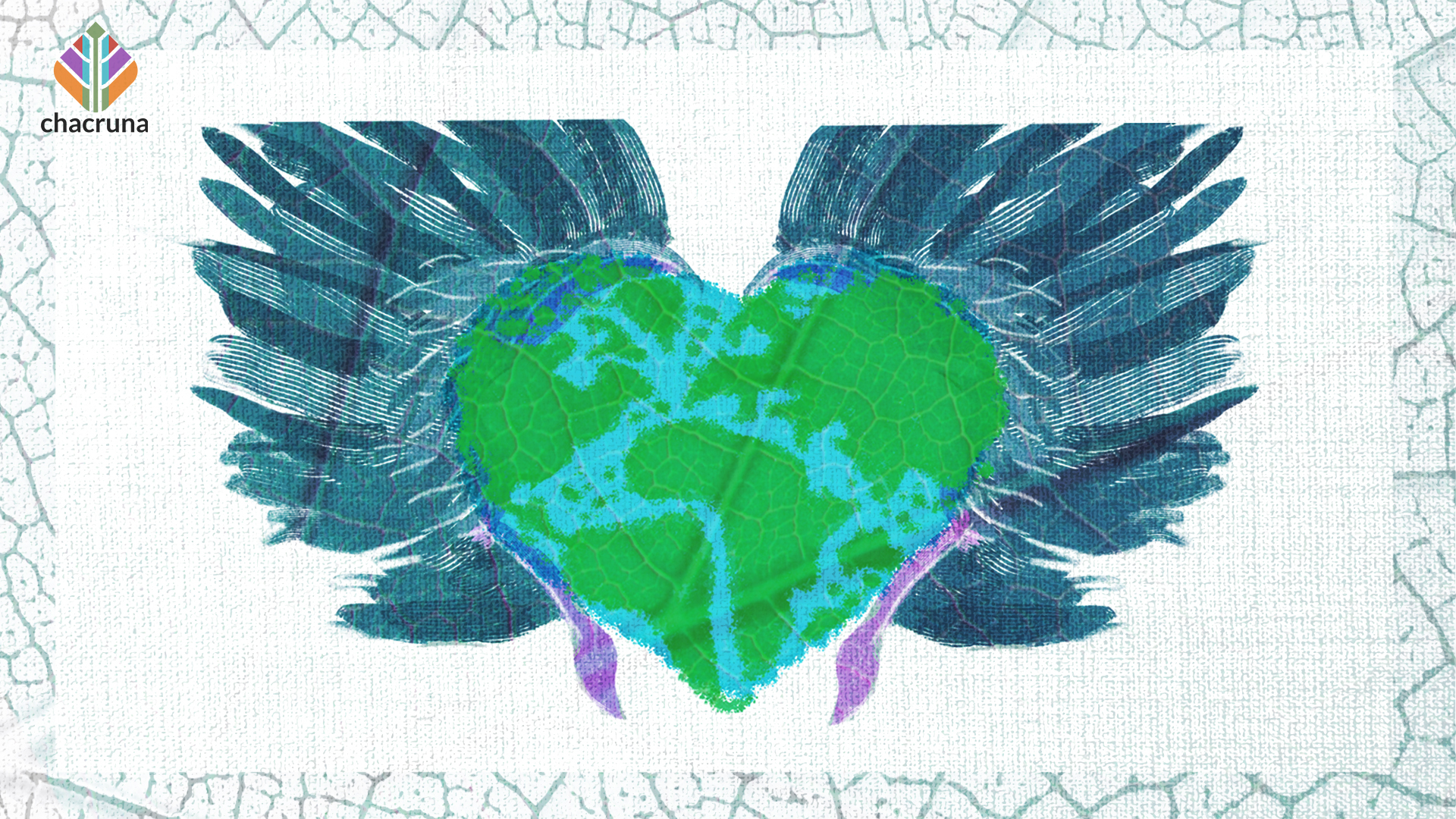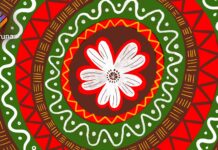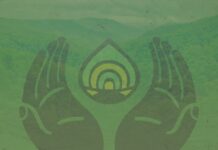- A Collective Call for Accountability in Plant Medicine Experiences - October 23, 2020
- A Collective Call for Accountability in Plant Medicine Experiences - October 23, 2020
- A Collective Call for Accountability in Plant Medicine Experiences - October 23, 2020
Plant medicine practices in the West have mostly been used for personal healing, empowerment or self-actualization. However, in Indigenous settings, these practices have been ancestrally used for mobilizing forms of responsibility and accountability towards the wider metabolism of the planet that we are all a part of. In this text, we draw on the work of the network “Teia das 5 Curas” to put forward an invitation to take seriously the call for maturity, sobriety, humility, and accountability issued by Indigenous communities. This invitation starts with a proposal that we need a type of plant medicine education that can help us confront and compost the collective traumas created by historical, systemic, and ongoing violence and the unsustainability of modernity-coloniality. We emphasize that this process is especially important for those who have benefited and still benefit from this violence and unsustainability.
Our collaborations amplify the visibility of Indigenous practices that can help tackle the ecological, health, and social crises that the modern-colonial system has created.
The “Teia das 5 Curas” (web of five modes of healing) network was created in 2017 as a network that brought together a number of Indigenous communities in Brazil, Peru, Mexico, and Canada. The network was created in collaboration with researchers at the University of British Columbia and the arts/research/ecology collective, Gesturing Towards Decolonial Futures. Our collaborations amplify the visibility of Indigenous practices that can help tackle the ecological, health, and social crises that the modern-colonial system has created. At the same time, we seek to amplify sensitivity to common harmful patterns that tend to emerge in the context of engagements with Indigenous practices.
The network mobilizes political, pedagogical, artistic and research practices that center the Earth (rather than human communities or identities) as the metabolic system that creates and sustains life. These practices also emphasize the importance of ethical engagements that are based on trust, reciprocity, consent, respect, and accountability. This is very challenging because understandings of what these things might mean can be very different for Indigenous and non-Indigenous people, especially when we consider the historically inherited colonial power relations that shape any such engagements. Inevitably, many uncomfortable realizations, as well as smaller and larger missteps, are also part of the learning process. Imagining that we have this issue covered once and for all is very tempting, but dangerously counterproductive.
The network issues a call for relational maturity, sobriety, and responsibility as we face the decline and potential collapse of modern-colonial systems, so that we can build collective capacity to hold space for disillusionment and for difficult and painful things in more generative ways.
This ethical orientation applies to Indigenous peoples, knowledges, and ways of knowing and being, as well as to non-human relations, including the earth, water, forests, plant medicines, and even language and stories as living entities. The network issues a call for relational maturity, sobriety, and responsibility as we face the decline and potential collapse of modern-colonial systems, so that we can build collective capacity to hold space for disillusionment and for difficult and painful things in more generative ways.
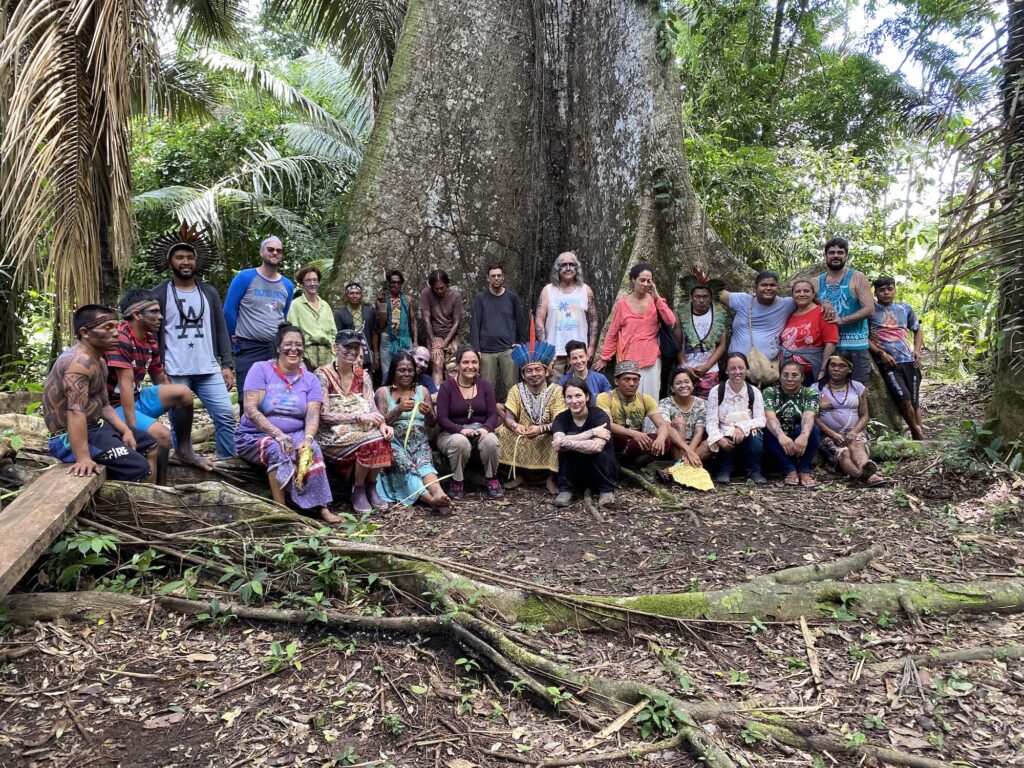
This work is multilayered. Part of it is about mapping how engagements with Indigenous communities have been based on extraction, appropriation, consumption, and misrepresentation of Indigenous knowledges and practices. These engagements can also take the form of selectively and tokenistically including Indigenous voices, only when it is convenient. A deep understanding of how things have gone wrong is necessary if we want to learn to relate “otherwise” and engender wiser, more accountable forms of solidarity based on trust, reciprocity, consent, respect, and accountability.
Another part of the work is about highlighting Indigenous teachings that can help us face the end of the world as we know it from a healthier space. Part of it is also about sharing knowledges and practices between Indigenous communities that can build alternative support systems (e.g., food and water security and alternative health systems), stamina, resilience, and backup for the long haul of the collective work of hospicing worlds that are dying and assisting with the birth of new worlds. And part of it is about cocreating educational guidance across cultures that does not claim to be universally relevant, but that carefully braids Indigenous and non-Indigenous knowledge systems to heal our ways of thinking, feeling, relating, distributing resources, and facing life, pain, grief, and death.
The Indigenous healers, pajés, and leaders that are part of the network have frequently raised concerns about how plant medicine practices have been largely used in the West for individuals to access personal power or for self-actualization, rather than to mobilize political and existential responsibility towards the planet and accountability and reciprocity towards Indigenous peoples who have been the guardians of these medicines.
In this sense, one of the issues repeatedly raised in the network relates to spiritual bypassing in psychedelic communities in the West. The Indigenous healers, pajés, and leaders that are part of the network have frequently raised concerns about how plant medicine practices have been largely used in the West for individuals to access personal power or for self-actualization, rather than to mobilize political and existential responsibility towards the planet and accountability and reciprocity towards Indigenous peoples who have been the guardians of these medicines. These conversations call for a recognition of our complicity in racial and colonial violence, for non-extractive relations with Indigenous communities, and for entheogenic education and practices that can move us from the expansion of individualistic entitlements towards visceral responsibility towards the metabolism of the planet that we are a part of. This kind of visceral responsibility is not an intellectual choice or a matter of convenience; it works at affective and relational layers and precedes formal cognition or the allocation of will. In other words, we cannot proclaim, think or will our way towards it, but we can remove (with and/or without the help of plant medicines) some of the affective barriers that we have built against it.
Indigenous practices that work towards this form of responsibility can be described as a non-Western form of psychoanalysis that can declutter our unconscious and enable the bio-intelligence of the Earth to rewire our neurobiology and recalibrate our vital compass towards maturity, sobriety, humility, and accountability. This type of neuro-decolonization feels very different from what is often sought in experiences of nondual consciousness, where feelings of elation and transcending worldly concerns are sought as a personal goal.
For responsibility to be effectively mobilized through plant medicine experiences, participants need to be prepared to disarm affective landmines, to decenter and dethrone ego-logical desires (especially the search for unequivocal meanings), to interrupt colonial investments and entitlements (e.g., in universality, neutrality, self-transparency, exceptionalism), and to build capacity to hold space for difficult and painful things without wanting to be rescued or feeling immobilized. This is very difficult to achieve, not just because of the multiple defenses of the ego, but also because many Westernized plant medicine practices are actively geared towards affirming most of these desires and investments, especially the desires for interpretative certainty (universal and fixed meanings) and individual exceptionalism (finding or affirming one’s true, divine self and purpose).
In the Teia das 5 Curas network, the necessary preparation for engaging in plant medicine experiences involves parallel practices that build stamina and resilience, including sensorial deprivation or overload (long term fasting, silence, solitude, dancing, singing, exposure to extreme heat and cold, specific breathing techniques) and rituals that oversaturate the human capacity for cognition and that can deactivate the desire for understanding and the fear of pain.
This kind of work requires us to address four constitutive disavowals—or denials—of the modern-colonial systems that we have been socialized into and that underwrite our livelihoods:
- the denial of systemic, historical, and ongoing violence and of complicity in harm (the fact that our comforts, securities, and enjoyments are subsidized by expropriation and exploitation here and elsewhere);
- the denial of the limits of the planet and of the unsustainability of modernity-coloniality (the fact that the finite Earth-metabolism cannot sustain exponential growth, consumption, extraction, exploitation, and expropriation indefinitely);
- the denial of entanglement (our insistence in seeing ourselves as separate from each other and the land, rather than “entangled” within a wider living metabolism that is bio-intelligent); and,
- the denial of the magnitude and the complexity of the problems we need to face together (the tendency to look for simplistic solutions that make us feel and look good and that may address symptoms, but not the root causes of our collective complex predicament).
Oneness is often weaponized against attempts to raise questions of accountability in relation to cultural appropriation or paternalistic and consumptive engagements with Indigenous communities.
These denials manifest in psychedelic communities in different ways. One example is the affirmation of oneness and connectedness with the beauty of everything, while foreclosing the fact that we are also one with what is broken, diseased, and messed up in ourselves and in the world. Oneness is also mobilized to deflect critiques of privilege; the way that very tangible psychic and material divisions have been instituted and maintained for the benefit of some at the expense of others, both human and non-human. Oneness is often weaponized against attempts to raise questions of accountability in relation to cultural appropriation or paternalistic and consumptive engagements with Indigenous communities.
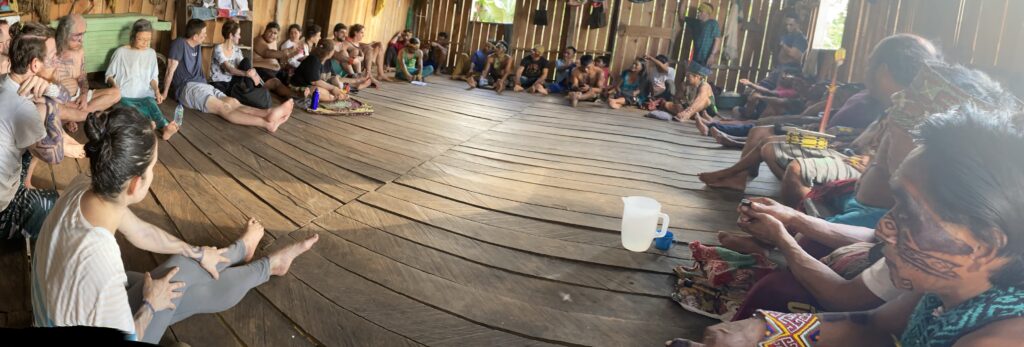
For example, in a recent event about ayahuasca in Vancouver, a group of (white, middle-class) speakers were called out on their modes of problematic representations and engagements with Indigenous communities. Their responses to being challenged illustrate common patterns of fragility in the psychedelic communities:
“The plant told me I was exceptionally pure” [therefore, I am innocent and not complicit in harm].
“The plant teaches us about oneness, and it is you [calling privilege out] who is bringing divisiveness to this space.”
“The plant showed me that I am a reincarnation of an Indigenous elder and, therefore, I represent their perspective here, from a spiritual space.”
These responses are not surprising, since engagement with the plant medicines in the West has generally been driven by a desire for expansion of entitlements rather than a call for responsibility. The same pattern is at work in many responses to Indigenous people’s efforts to emphasize the importance of political accountability in relation to engagements with the plant medicines. For instance, in psychedelic communities, it is common for political claims around Indigenous sovereignty to be countered with the notion that “we are all Indigenous,” or that the psychedelic space is not a political space, or a space for politics. The claim that something is not political is, in fact, a very political claim. This claim reflects the need for deeper and more accountable engagements with the current politics of using spirituality to bypass ongoing historical and systemic complicity in violence in spaces of psychedelic practice.
In the Gesturing Towards Decolonial Futures collective, we refer to this as the work of “composting (individual and collective) sh*t” that interrupts the tendency for people to want to be connected only with beauty, innocence, and virtue as a form of escape from accountability. There are a thousand ways we can try to avoid dealing with sh*t (here we mapped 101), including many that give a false impression that we are actually working on it. But, unless we begin with that, there is little the plants can do to break the mirror of our self-delusions and narcissistic tendencies. No sh*t, no starter. Our understanding of composting, based on shared teachings in the Teia das 5 Curas network, can be described as follows:
Capacity for holding space: for painful and difficult things that are irritating and overwhelming, but without being immobilized or wanting to be coddled or rescued
Owning up to one’s complicity and implication in harm: the harms of violence and unsustainability required to create and maintain “the world as we know it” with the pleasures, certainties, and securities that we enjoy
Maturity: to face and work on individual and collective “sh*t,” rather than denying or dumping it onto others, or spreading it around
Pausing narcissistic, hedonistic, and “fixing” compulsions: in order to identify, interrupt, and disinvest from harmful desires, entitlements, projections, fantasies, and idealizations
Othering our self-images and self-narratives: in order to encounter the “self beyond the self,” including the beautiful, the ugly, the broken, and the f*cked up in everything and everyone
Stamina and sobriety to show up differently: to do what is needed rather than what is pleasurable, easy, comfortable, consumable or convenient
Turning towards unlimited responsibility: with humility, compassion, serenity, openness, solidarity, mutuality, and without investments in purity, protagonism, progress or popularity
To sum up, this (non-exhaustive) composting to-do list is not a manifesto that can be enacted wilfully, though we surely have the responsibility and choice to work on it. However, merely saying, thinking, and seeing ourselves as humble, compassionate, serene, and open will not make us that. It is more likely a reliable indicator of the opposite. Arguably, one of the few things that can help us move in the direction of composting is through engagement with something that recodes the unconscious part of our psyche that precedes and underwrites the conscious behaviour. Plant medicine experiences certainly have that potential to help, but we also need to do our part.
Our modern addiction to consumption (of stuff, experiences, relationships, self-care, knowledge, and even critique) still drives our engagements with the plants and prevents us from fully accessing their teachings.
In this, it is important to remember that the Indigenous communities who are the ancestral keepers of multiple medicines (plant-based or not) are having to deal with growing numbers of people whose social and cultural background has not adequately (or at all) prepared them to engage in a respectful, reciprocal, and accountable way with the plants and their keepers. To put differently: If we—members of modern, colonial societies—had our sh*t together, or had developed ways of composting it that actually worked, we would not need to look for medicines elsewhere. Our modern addiction to consumption (of stuff, experiences, relationships, self-care, knowledge, and even critique) still drives our engagements with the plants and prevents us from fully accessing their teachings. Unfortunately, most engagements with Indigenous communities and their teachings reproduce these consumptive patterns as well.
The increased interest in Indigenous knowledges and medicines can be interpreted as a double-edged sword. The mode of consumption driving our behaviour and the “industry of the self” (within and around us) increases the labor of Indigenous people and prevents us from being open to being taught. We need to unlearn these harmful habits in order to learn to decenter, to disarm, to declutter, to discern, and to disinvest in harmful desires. This means working with the plant teachers and their keepers in ways that shift the locus of our accountability away from ourselves and towards those and that which sustains all of us. A generative starting place might be to begin with humility by acknowledging that perhaps we can not even imagine what that means or how it feels yet.
Art by Mariom Luna.
Take a minute to browse our stock:
Did you enjoy reading this article?
Please support Chacruna's work by donating to us. We are an independent organization and we offer free education and advocacy for psychedelic plant medicines. We are a team of dedicated volunteers!
Can you help Chacruna advance cultural understanding around these substances?










